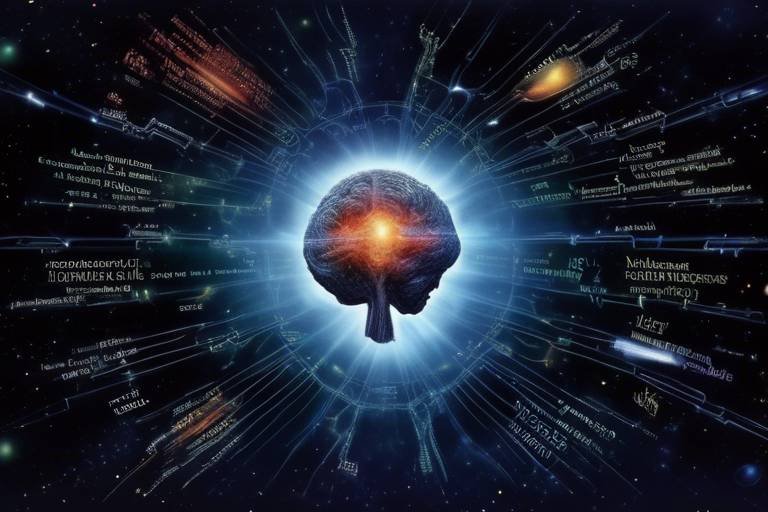The Intricate Relationship between Emotion and Consciousness
This article explores the complex interplay between emotions and consciousness, highlighting how they influence each other and shape our experiences, perceptions, and decision-making processes. Have you ever felt a rush of excitement that made your heart race, or a wave of sadness that clouded your judgment? These moments illustrate how deeply intertwined our emotions are with our conscious thoughts. Understanding this relationship can unlock insights into our behavior, enhance our mental well-being, and improve our interactions with others.
Emotions are fundamental human experiences that affect our thoughts and behaviors. They can be as fleeting as a summer storm or as enduring as the changing seasons. Understanding their nature helps us comprehend how they interact with our conscious awareness and influence our daily lives. Emotions serve as signals, alerting us to our needs, desires, and the world around us. They can motivate us to take action or cause us to pause and reflect. For instance, the feeling of fear might prompt someone to escape a dangerous situation, while joy can inspire creativity and connection with others.
Consciousness is the state of being aware of and able to think about one's own existence and experiences. This section delves into how consciousness shapes our emotional experiences and responses. When we consciously engage with our emotions, we can better understand their origins and implications. It’s like shining a flashlight in a dark room; suddenly, the shadows of confusion and uncertainty dissipate, revealing the true nature of our feelings. This awareness allows us to navigate our emotional landscape more effectively, fostering personal growth and resilience.
Different types of consciousness, such as primary and reflective consciousness, play distinct roles in how we perceive emotions. This section examines these types and their implications for emotional processing. Primary consciousness is our immediate awareness of feelings and perceptions. It is crucial for experiencing emotions in real-time, allowing individuals to respond instinctively to their emotional states. In contrast, reflective consciousness involves higher-order thinking about emotions. It enables individuals to analyze and evaluate their feelings, fostering emotional regulation and deeper self-understanding.
Primary consciousness refers to immediate awareness of feelings and perceptions. It is essential for experiencing emotions in real-time, allowing individuals to respond instinctively to their emotional states. For instance, when you touch something hot, your primary consciousness triggers an immediate reaction to pull your hand away, illustrating how our emotions can drive quick, instinctual actions. This direct connection between emotion and consciousness is vital for survival and navigating daily life.
Reflective consciousness, on the other hand, involves a more complex layer of awareness. It allows us to step back and think critically about our emotions. Have you ever felt angry but later realized that your anger stemmed from feeling unappreciated? This reflective process helps us understand the root causes of our feelings, enabling us to manage them more effectively. It fosters emotional regulation, allowing us to respond thoughtfully rather than react impulsively, thus enhancing our relationships and overall well-being.
The relationship between emotion and consciousness is bidirectional, with each influencing the other. Emotions can alter conscious thought. For example, when we are anxious, our minds may race, leading to negative thought patterns that further exacerbate our anxiety. Conversely, conscious thought can shape our emotional responses. By consciously choosing to focus on positive aspects of a situation, we can often mitigate negative feelings. This interplay is akin to a dance, where each partner influences the other's movements, creating a dynamic and evolving experience.
Emotional awareness is the ability to recognize and understand one's emotions. This section explores its significance in regulating emotions and enhancing overall mental well-being. Being emotionally aware is like having a compass that guides us through the turbulent seas of life. It helps us navigate our feelings, allowing us to respond to situations with clarity and intention rather than confusion and chaos. When we understand our emotions, we can make better decisions, improve our relationships, and foster a healthier mindset.
Effective emotional regulation strategies can improve mental health. Techniques such as mindfulness, cognitive reappraisal, and expressive writing can help manage emotions constructively. Mindfulness encourages us to stay present, acknowledging our feelings without judgment. Cognitive reappraisal involves reframing our thoughts about a situation to alter its emotional impact. Expressive writing allows us to articulate our feelings, providing clarity and relief. These strategies empower us to take charge of our emotional responses, leading to a more balanced and fulfilling life.
Emotional intelligence plays a crucial role in navigating the relationship between emotion and consciousness. It involves recognizing, understanding, and managing our emotions while also being attuned to the emotions of others. This section examines how developing emotional intelligence can enhance self-awareness and interpersonal relationships. By cultivating emotional intelligence, we can improve our communication skills, foster empathy, and build stronger connections with those around us. It’s like adding a new dimension to our interactions, transforming them from surface-level exchanges into meaningful dialogues.
- What is the difference between primary and reflective consciousness?
Primary consciousness involves immediate awareness of feelings, while reflective consciousness allows for deeper analysis and understanding of those feelings. - How can I improve my emotional awareness?
Practicing mindfulness and keeping a journal can enhance your ability to recognize and understand your emotions. - Why is emotional intelligence important?
Emotional intelligence helps improve relationships, enhances communication, and fosters better mental health.

The Nature of Emotions
Emotions are an integral part of our human experience, acting as both a compass and a catalyst for our thoughts and behaviors. Imagine emotions as colorful threads woven into the fabric of our daily lives, influencing our reactions, decisions, and interactions. They can be as fleeting as a summer breeze or as powerful as a raging storm, shaping our perceptions and guiding our actions in profound ways. Understanding the nature of emotions is crucial for grasping how they intertwine with our conscious awareness.
At their core, emotions are complex responses to stimuli, arising from our interactions with the world around us. They can be triggered by external events, such as receiving good news or facing a challenging situation, or they can emerge from internal reflections and thoughts. This duality makes emotions both reactive and proactive, as they can arise spontaneously or be cultivated through our conscious choices. For instance, when we think about a cherished memory, a wave of joy can wash over us, illustrating how our thoughts can evoke strong emotional responses.
Moreover, emotions serve several essential functions in our lives. They help us:
- Communicate: Emotions are a universal language, allowing us to express feelings and connect with others.
- Motivate: They drive us to take action, whether it's pursuing a goal or avoiding a threat.
- Regulate: Emotions can guide our decision-making processes, influencing our choices in various situations.
However, emotions are not just simple reactions; they are layered and nuanced. They can vary in intensity, duration, and complexity, and can be influenced by various factors, including culture, personal experiences, and even biology. Take, for example, the feeling of sadness. For some, it may be a fleeting moment triggered by a minor disappointment, while for others, it could be a profound and enduring experience stemming from loss or grief. This variability highlights the subjective nature of emotions and their intricate relationship with our consciousness.
Furthermore, emotions are often intertwined with physiological responses. When we experience fear, our body reacts with increased heart rate and heightened alertness, preparing us for a fight-or-flight response. This physical manifestation of emotion showcases how closely linked our bodies and minds are, emphasizing that emotions are not just mental states but holistic experiences that encompass our entire being. Understanding this connection can lead to greater emotional awareness and regulation, ultimately enhancing our overall mental well-being.
In conclusion, the nature of emotions is multifaceted and deeply embedded in our human experience. They influence our thoughts, behaviors, and interactions, shaping our perceptions of the world. By exploring and understanding our emotions, we can better navigate the complexities of our conscious awareness and improve our emotional intelligence, leading to a more fulfilling and connected life.
Q: What are the primary functions of emotions?
A: Emotions serve to communicate feelings, motivate actions, and regulate decision-making processes.
Q: How do emotions and consciousness interact?
A: Emotions can influence conscious thought, and vice versa; they are in a bidirectional relationship that shapes our experiences.
Q: Can emotions be regulated?
A: Yes, emotional regulation strategies, such as mindfulness and cognitive reappraisal, can help manage emotions constructively.

Consciousness is not just a passive state of awareness; it is a dynamic and active process that shapes our emotional experiences. Think of consciousness as a spotlight, illuminating certain aspects of our thoughts and feelings while leaving others in the shadows. This illumination allows us to navigate through our emotional landscape, making sense of the swirling feelings that often accompany our daily lives. Without this conscious awareness, many emotions could remain murky and unprocessed, leading to confusion and distress.
One of the most fascinating aspects of consciousness is its ability to influence our emotional responses. For instance, when we consciously reflect on a stressful situation, we can choose how to react, rather than being swept away by raw emotion. This ability to evaluate our feelings allows us to gain control over our emotional responses, fostering a sense of empowerment in our daily interactions. Imagine standing at a crossroads, where one path leads to a reaction driven purely by emotion and the other leads to a thoughtful response. Consciousness acts as the compass that guides us toward a more measured approach.
Moreover, consciousness plays a pivotal role in shaping our self-perception and identity. Our emotions are often tied to our sense of self, and the way we consciously interpret our emotional experiences can significantly impact our self-esteem and overall mental health. For example, if we consciously acknowledge feelings of sadness, we can better understand their roots and contexts, allowing us to integrate these emotions into our personal narrative. This process can transform feelings of despair into opportunities for growth and self-discovery.
Furthermore, consciousness is not a monolith; it encompasses various types that interact with our emotional experiences in different ways. Primary consciousness, which involves immediate awareness of our feelings, allows us to experience emotions as they happen. On the other hand, reflective consciousness enables us to step back and analyze those emotions. This duality creates a rich tapestry of emotional experience, where instinct and analysis work hand in hand. To illustrate this, consider the following table:
| Type of Consciousness | Description | Impact on Emotions |
|---|---|---|
| Primary Consciousness | Immediate awareness of feelings and perceptions | Allows instinctive emotional responses |
| Reflective Consciousness | Higher-order thinking about emotions | Facilitates analysis and regulation of emotions |
In essence, the role of consciousness in our emotional lives is both profound and multifaceted. It allows us to not only experience emotions but also to understand and regulate them. By honing our consciousness, we can improve our emotional intelligence, leading to healthier relationships and a more balanced life. So, the next time you find yourself in a whirlwind of emotions, remember that your consciousness is the key to navigating through the storm.
- What is consciousness? Consciousness is the state of being aware of and able to think about one's own existence and experiences.
- How does consciousness affect emotions? Consciousness shapes our emotional experiences by allowing us to reflect on and analyze our feelings, leading to better emotional regulation.
- What are the types of consciousness? The two main types are primary consciousness, which involves immediate awareness of emotions, and reflective consciousness, which involves higher-order thinking about those emotions.
- Why is emotional awareness important? Emotional awareness helps us recognize and understand our feelings, which is crucial for emotional regulation and mental well-being.

When we talk about consciousness, we're diving into a fascinating realm that shapes our emotional experiences in profound ways. Consciousness isn't just a single entity; it comes in different forms, each playing a unique role in how we perceive and respond to our emotions. Understanding these types can give us insight into how we navigate our feelings and interactions with the world around us.
Two primary types of consciousness are often discussed in psychological literature: primary consciousness and reflective consciousness. Each type serves distinct functions and influences our emotional landscape in different ways. Let’s unpack these concepts further.
Imagine standing on the edge of a cliff, feeling the rush of wind against your face. That immediate awareness of your surroundings and the feelings coursing through you at that moment is what we refer to as primary consciousness. It’s about being in the here and now, fully engaged with your emotions and perceptions without overthinking them. This type of consciousness allows for instinctive reactions, like jumping back from the edge when you feel a twinge of fear. It’s the raw, unfiltered experience of emotions that helps us react swiftly to our environment.
Primary consciousness is crucial for survival; it ensures that we are aware of our feelings as they happen. This immediacy is what makes our emotional responses so potent and visceral. For instance, when you feel joy, sadness, or anger, primary consciousness allows you to experience those emotions fully, leading to genuine reactions that can be both enlightening and overwhelming.
On the flip side, we have reflective consciousness, which involves a deeper level of processing. This is where things get interesting! Reflective consciousness allows us to step back and think about our emotions. It’s like watching a movie of our feelings instead of being in the scene. When you reflect on why you felt a certain way during a conversation or analyze your emotional responses after a tough day, you’re engaging in reflective consciousness. This higher-order thinking enables us to evaluate our feelings, fostering emotional regulation and a deeper understanding of ourselves.
Reflective consciousness is essential for personal growth. It helps us make sense of our emotional experiences, learn from them, and apply that knowledge to future situations. For example, if you realize that your anger in a recent argument stemmed from feeling unheard, you can approach similar situations differently in the future. This type of consciousness empowers us to transform our emotional experiences into valuable lessons.
In summary, the interplay between primary and reflective consciousness is integral to how we experience emotions. While primary consciousness immerses us in the moment, reflective consciousness encourages us to analyze and learn from those moments. Together, they create a rich tapestry of emotional awareness that shapes our understanding of ourselves and our interactions with others.
- What is the difference between primary and reflective consciousness?
Primary consciousness involves immediate awareness of feelings and perceptions, while reflective consciousness allows for deeper analysis and understanding of those emotions. - How do these types of consciousness affect emotional regulation?
Primary consciousness helps us respond instinctively to emotions, whereas reflective consciousness aids in evaluating and regulating those emotions for better outcomes. - Can we develop our reflective consciousness?
Yes! Engaging in practices like journaling, mindfulness, and self-reflection can enhance our reflective consciousness.

Primary consciousness is like the canvas of our immediate emotional experiences, a vivid backdrop against which our feelings play out in real-time. Imagine walking through a bustling market: the vibrant colors, the cacophony of sounds, and the scents wafting through the air all contribute to your immediate awareness. This is what primary consciousness is all about—it's the raw, unfiltered experience of emotions and perceptions as they happen. It allows us to feel joy when we see a loved one, anxiety when faced with a deadline, or excitement when embarking on a new adventure.
This form of consciousness is crucial because it enables us to respond instinctively to our emotional states. When we encounter a situation that triggers fear, for instance, primary consciousness kicks in, prompting a quick response, often before our rational mind has a chance to process the event. Think of it as an emotional alarm system that alerts us to potential dangers or joys, ensuring we navigate our environment effectively.
To better understand primary consciousness, consider the following characteristics:
- Immediate Awareness: It encompasses the direct experience of emotions without the filter of reflection or analysis.
- Instinctive Reactions: It facilitates quick, often unconscious responses to emotional stimuli, allowing for survival and adaptation.
- Real-Time Processing: Emotions are felt as they occur, providing a rich tapestry of experiences that shape our perception of reality.
Interestingly, primary consciousness is not just about feeling emotions; it’s also about the integration of sensory information. For example, when you hear a friend’s laughter, see their smile, and feel warmth from their presence, all these sensations combine to create a profound emotional experience. This interconnectedness highlights how emotions are not isolated; they are deeply woven into the fabric of our consciousness.
Moreover, primary consciousness plays a significant role in our day-to-day decision-making. When faced with choices, our immediate emotional responses can heavily influence our decisions—sometimes even overriding logical reasoning. For instance, if you feel a surge of excitement about a new job opportunity, that emotion might propel you to take the leap, even if your analytical side raises concerns. In this way, primary consciousness acts as both a compass and a guide, steering us through the complexities of life based on how we feel in the moment.
In summary, primary consciousness is essential for experiencing emotions as they happen. It allows us to engage with the world around us in a visceral way, shaping our perceptions and decisions. Without it, our emotional landscape would be flat and monotonous, lacking the richness that makes life so vibrant and fulfilling.
- What is primary consciousness? Primary consciousness refers to the immediate awareness of feelings and perceptions, allowing individuals to experience emotions in real-time.
- How does primary consciousness affect decision-making? It influences decisions by providing instinctive emotional responses that can guide choices, sometimes overriding logical reasoning.
- Can primary consciousness be developed or enhanced? While it's a natural part of human experience, practices like mindfulness can help individuals become more attuned to their primary consciousness.

Reflective consciousness is a fascinating aspect of our mental lives, acting as a mirror that allows us to examine our emotions and thoughts with a critical eye. Unlike primary consciousness, which is all about the immediate, visceral experience of feelings, reflective consciousness invites us to step back and analyze what we are feeling and why. It's like having a conversation with yourself, where you not only express emotions but also question their origins and implications. This process is crucial for personal growth and emotional regulation.
When we engage in reflective consciousness, we often find ourselves asking questions that can lead to deeper insights. For instance, we might ponder: What triggered this emotion? or How does this feeling affect my behavior? These inquiries help us to not only understand our emotional landscape but also to navigate it more effectively. By cultivating this ability, we can enhance our emotional intelligence, which is essential for both personal well-being and our interactions with others.
Moreover, reflective consciousness allows us to evaluate our emotional responses in a more structured way. It encourages us to consider alternative perspectives, which can lead to healthier emotional outcomes. For example, when faced with anger, instead of reacting impulsively, reflective consciousness enables us to pause and think: Is this anger justified? or How might I express this feeling constructively? This kind of self-reflection can be transformative, turning potentially negative emotions into opportunities for growth and understanding.
Incorporating reflective practices into our daily routines can significantly enhance our emotional well-being. Here are a few techniques that can help:
- Journaling: Writing down your thoughts and feelings can clarify your emotional state and help you identify patterns over time.
- Mindfulness Meditation: This practice encourages you to observe your thoughts and emotions without judgment, fostering a deeper understanding of your inner world.
- Therapeutic Conversations: Engaging in discussions with a therapist or trusted friend can provide external perspectives that enrich your reflective process.
Ultimately, embracing reflective consciousness not only deepens our understanding of ourselves but also enhances our relationships with others. By recognizing our emotional triggers and responses, we can communicate more effectively and empathize with those around us. It's like upgrading your emotional toolkit—equipping yourself with the skills to handle life's ups and downs with grace and insight.
- What is reflective consciousness? Reflective consciousness is the ability to think about and analyze one's own emotions and thoughts, allowing for deeper self-understanding and emotional regulation.
- How can I improve my reflective consciousness? Techniques such as journaling, mindfulness meditation, and engaging in therapeutic conversations can enhance your reflective abilities.
- Why is reflective consciousness important? It helps us understand our emotions better, leading to improved emotional intelligence and healthier relationships.

The relationship between emotion and consciousness is a fascinating dance, a bidirectional interplay where each aspect significantly influences the other. Imagine emotions as vibrant colors splashed across the canvas of consciousness; they can alter the hue of our thoughts, shifting our perceptions and reactions in real-time. When we feel joy, for instance, our conscious thoughts may become more optimistic, leading us to engage with the world in a more positive way. Conversely, when we are engulfed by sadness, our consciousness can become clouded, distorting our ability to see the bright side of life.
One of the most intriguing elements of this interplay is how emotions can hijack our conscious thought processes. Have you ever noticed how a sudden rush of anger can prompt impulsive decisions? This is a classic example of how emotions can take the wheel, steering our thoughts and actions in directions we might not consciously choose. In such moments, our emotional responses can overshadow rational thinking, leading to outcomes we later regret. This phenomenon is often referred to as emotional flooding, where intense feelings overwhelm our cognitive capacities.
On the flip side, consciousness also plays a pivotal role in shaping our emotional experiences. Consider the practice of mindfulness; when we consciously focus on our emotions without judgment, we can create space to process them more effectively. This conscious awareness allows us to step back from our immediate emotional reactions, enabling us to respond rather than react. In this way, consciousness acts as a guiding hand, helping us navigate the turbulent waters of our emotional landscape.
To illustrate this interplay further, let’s break it down into a simple table:
| Influence | Emotion on Consciousness | Consciousness on Emotion |
|---|---|---|
| 1 | Can lead to impulsive decisions (e.g., anger leading to rash actions) | Facilitates emotional processing (e.g., mindfulness helping to manage stress) |
| 2 | Shapes perceptions of reality (e.g., happiness enhancing positive outlook) | Allows for reflection and understanding of feelings (e.g., journaling about emotions) |
| 3 | Can create biases in decision-making (e.g., fear distorting risk assessment) | Enables emotional regulation (e.g., cognitive reappraisal to change emotional responses) |
This intricate relationship is not only important for personal growth but is also crucial in interpersonal relationships. Understanding how our emotions can affect our conscious thoughts allows us to communicate more effectively and empathize with others. For instance, if we recognize that someone is upset, we can consciously choose to approach them with kindness, rather than reacting to their emotional state with frustration or defensiveness.
In conclusion, the interplay between emotion and consciousness is a dynamic and ongoing process that shapes our experiences and interactions. By becoming more aware of this relationship, we can harness the power of our emotions while maintaining a conscious grip on our thoughts and actions. This balance is essential for fostering emotional intelligence and enhancing our overall well-being.
- What is the relationship between emotion and consciousness?
Emotion and consciousness influence each other, where emotions can alter conscious thought and vice versa. - How can understanding this interplay help in daily life?
By recognizing how emotions affect our thoughts, we can make more informed decisions and improve our emotional regulation. - What techniques can enhance emotional regulation?
Mindfulness, cognitive reappraisal, and expressive writing are effective strategies for managing emotions. - Why is emotional intelligence important?
Emotional intelligence helps us navigate our emotions and understand the emotions of others, improving relationships and mental health.

Emotional awareness is like having a personal compass that guides you through the stormy seas of your feelings. It’s the ability to recognize and understand your emotions, which is crucial for navigating life’s ups and downs. Imagine trying to sail a boat without knowing where the wind is coming from—it's pretty chaotic, right? Similarly, without emotional awareness, our reactions can be impulsive and misguided, leading to misunderstandings and conflict. By honing this skill, we empower ourselves to respond thoughtfully rather than react blindly, enabling a deeper connection with ourselves and others.
Understanding our emotions is just the tip of the iceberg; it also involves recognizing how these feelings influence our thoughts and behaviors. When we become aware of our emotional states, we can better manage them. This is where emotional regulation comes into play. Think of emotional regulation as the steering wheel of your emotional journey. It allows you to navigate through difficult feelings, ensuring you don’t veer off course into the rocky shores of anxiety or depression.
So, how does one cultivate emotional awareness and regulation? Here are a few strategies that can help:
- Mindfulness: Practicing mindfulness involves being present in the moment and observing your thoughts and feelings without judgment. This can be as simple as taking a few deep breaths and tuning into your body’s sensations.
- Cognitive Reappraisal: This technique allows you to reframe a negative situation by changing your perspective. For example, viewing a challenging task as an opportunity for growth can reduce feelings of anxiety.
- Expressive Writing: Writing about your feelings can be a powerful tool for emotional regulation. It provides an outlet for your emotions and can help you gain clarity on what you’re experiencing.
Additionally, emotional awareness and regulation are not just personal skills; they significantly impact our relationships. When we understand our emotions better, we can communicate more effectively with others. This fosters empathy and strengthens connections, creating a supportive environment where everyone feels valued. Think of it as building a bridge of understanding between yourself and others, where emotions flow freely and constructively.
Moreover, emotional awareness can lead to enhanced mental well-being. Research indicates that individuals who practice emotional regulation techniques tend to experience lower levels of stress and anxiety. They’re also more resilient in the face of challenges. By acknowledging and addressing our emotions, we reduce the likelihood of them bubbling over in unhealthy ways, such as through anger or withdrawal.
In conclusion, emotional awareness and regulation are essential components of emotional intelligence. By developing these skills, we can navigate the complexities of our emotional landscapes, leading to healthier relationships and improved mental health. It’s like having a toolkit that equips us to handle whatever life throws our way. So, why not start today? Tune into your emotions, practice mindfulness, and watch how your life transforms!
- What is emotional awareness? Emotional awareness is the ability to recognize and understand your own emotions, which helps in managing them effectively.
- How can I improve my emotional regulation? Techniques such as mindfulness, cognitive reappraisal, and expressive writing can significantly enhance your emotional regulation skills.
- Why is emotional awareness important? It allows for better decision-making, enhances relationships, and contributes to overall mental well-being.
- Can emotional regulation improve my mental health? Yes, effective emotional regulation can lead to lower levels of stress and anxiety, contributing to a healthier mental state.

Emotional regulation is like having a well-tuned instrument in an orchestra; it allows us to create harmony in our lives, even amidst chaos. The ability to manage our emotions effectively can lead to improved mental health, better relationships, and enhanced overall well-being. So, how can we fine-tune this instrument? Here are some effective strategies that can help you navigate the turbulent waters of your emotions.
First and foremost, mindfulness stands out as a powerful technique. It involves being present in the moment and observing your thoughts and feelings without judgment. Imagine standing on the shore, watching the waves come and go. Instead of getting swept away by the tide, you learn to appreciate the ebb and flow of your emotions. Practicing mindfulness can help you recognize emotional triggers and allow you to respond thoughtfully rather than react impulsively.
Another valuable strategy is cognitive reappraisal. This involves changing the way you think about a situation to alter its emotional impact. For instance, if you find yourself feeling anxious about a job interview, you might reframe it as an opportunity to showcase your skills rather than a test of your worth. This shift in perspective can significantly reduce anxiety and foster a more positive emotional state.
Additionally, engaging in expressive writing can be incredibly beneficial. Writing down your thoughts and feelings can provide a safe outlet for your emotions. It’s like taking a pressure cooker off the heat; you release built-up tension and gain clarity about your feelings. Research shows that expressive writing can lead to improved emotional well-being and even physical health benefits.
While these strategies are powerful on their own, combining them can amplify their effectiveness. For example, you might practice mindfulness to become aware of your emotions, use cognitive reappraisal to change your perspective, and then follow up with expressive writing to process the experience. This holistic approach not only enhances emotional regulation but also promotes a deeper understanding of oneself.
Incorporating these strategies into your daily routine can feel daunting at first, but remember, like any skill, emotional regulation takes practice. Start small; perhaps dedicate a few minutes each day to mindfulness or journaling. Over time, you’ll find that these practices become second nature, empowering you to handle life’s emotional ups and downs with grace and resilience.
- What is emotional regulation? Emotional regulation refers to the ability to monitor, evaluate, and modify emotional reactions to achieve desired outcomes.
- Why is emotional regulation important? It helps in maintaining mental health, improving relationships, and enhancing overall well-being.
- Can mindfulness really help with emotional regulation? Yes! Mindfulness allows you to observe emotions without judgment, helping you respond rather than react.
- How does cognitive reappraisal work? It involves changing your thoughts about a situation to alter its emotional impact, leading to healthier emotional responses.
- Is expressive writing effective for everyone? While it can be beneficial for many, it may not resonate with everyone. It's worth trying to see if it helps you.

Emotional intelligence (EI) is a term that often gets thrown around in discussions about personal and professional development. But what does it really mean, and why is it so important? At its core, emotional intelligence refers to the ability to recognize, understand, and manage our own emotions while also being able to empathize with others' feelings. This dual capability not only enhances our personal relationships but also significantly influences our professional interactions and decision-making processes.
Imagine walking into a room filled with people. If you possess high emotional intelligence, you can pick up on the subtle cues of body language, tone of voice, and facial expressions. This ability allows you to gauge the emotional atmosphere of the room and respond accordingly. It’s like having an emotional radar that helps navigate social interactions smoothly. When you can understand your own emotions, you become better equipped to handle stress, communicate effectively, and resolve conflicts. This is where the interplay between emotion and consciousness becomes evident—your conscious awareness of your feelings directly impacts how you relate to others.
Furthermore, emotional intelligence is not just about personal awareness; it also plays a critical role in fostering strong relationships. When you can empathize with others, you create a connection that goes beyond mere social niceties. People are more likely to trust and open up to someone who demonstrates understanding and compassion. This emotional bonding is essential in both personal and professional settings, as it cultivates a collaborative environment where individuals feel valued and understood.
In the workplace, emotional intelligence can be a game-changer. Leaders with high EI are often more effective because they can inspire and motivate their teams. They understand the emotional dynamics at play and can adjust their leadership style to meet the needs of their employees. This adaptability leads to increased job satisfaction and productivity. In fact, studies have shown that organizations with emotionally intelligent leaders tend to have lower turnover rates and higher employee engagement. The table below summarizes the key benefits of emotional intelligence in the workplace:
| Benefit | Description |
|---|---|
| Improved Communication | Enhances clarity and reduces misunderstandings in team interactions. |
| Stronger Relationships | Fosters trust and collaboration among team members. |
| Better Conflict Resolution | Enables constructive discussions and solutions to disagreements. |
| Increased Resilience | Helps individuals cope with stress and bounce back from setbacks. |
Moreover, developing emotional intelligence is a lifelong journey. It requires conscious effort and practice. Techniques such as mindfulness, active listening, and reflective journaling can significantly enhance your emotional awareness. By regularly checking in with your feelings and considering how they affect your interactions, you can cultivate a deeper understanding of both yourself and those around you. This self-awareness not only helps you navigate your emotional landscape but also empowers you to build stronger connections with others.
In conclusion, the impact of emotional intelligence on our lives cannot be overstated. It shapes our perceptions, influences our decisions, and enhances our interactions. By investing time in developing our emotional intelligence, we can create a more fulfilling personal and professional life, ultimately leading to improved mental well-being and stronger relationships. So, why not take a moment to reflect on your emotional intelligence today? What steps can you take to enhance it further?
- What is emotional intelligence? Emotional intelligence is the ability to recognize, understand, and manage your own emotions and the emotions of others.
- Why is emotional intelligence important? It is crucial for effective communication, strong relationships, and successful leadership.
- Can emotional intelligence be developed? Yes, emotional intelligence can be improved through practice and self-awareness.
- How does emotional intelligence impact decision-making? High emotional intelligence allows for more thoughtful and empathetic decision-making, considering both emotional and rational factors.
Frequently Asked Questions
- What are emotions, and why are they important?
Emotions are fundamental human experiences that influence our thoughts, behaviors, and overall well-being. They play a vital role in shaping our reactions to various situations, guiding our decisions, and enhancing our interactions with others. Understanding emotions can help us navigate life's challenges more effectively.
- How does consciousness affect our emotions?
Consciousness allows us to be aware of our emotions and reflect on them. It shapes our emotional experiences by enabling us to evaluate and respond to our feelings. This interplay between consciousness and emotion is crucial for self-awareness and emotional regulation.
- What is primary consciousness?
Primary consciousness refers to our immediate awareness of feelings and perceptions. It allows us to experience emotions in real-time, helping us respond instinctively to our emotional states. This form of consciousness is essential for our day-to-day emotional experiences.
- What is reflective consciousness?
Reflective consciousness involves higher-order thinking about our emotions. It enables us to analyze, evaluate, and make sense of our feelings, fostering emotional regulation and deeper self-understanding. This type of consciousness is important for personal growth and emotional intelligence.
- How can I improve my emotional awareness?
Improving emotional awareness involves practicing mindfulness, journaling about your feelings, and engaging in self-reflection. By regularly tuning in to your emotions and understanding their triggers, you can enhance your ability to recognize and manage them effectively.
- What are some effective strategies for emotional regulation?
Effective strategies for emotional regulation include mindfulness practices, cognitive reappraisal (reframing negative thoughts), and expressive writing. These techniques can help you manage your emotions constructively and improve your mental health.
- How does emotional intelligence impact relationships?
Emotional intelligence enhances self-awareness and empathy, which are crucial for building strong interpersonal relationships. By understanding your own emotions and those of others, you can communicate more effectively, resolve conflicts, and foster deeper connections.



















